- Home »
- Learningcenter »
- Energy credits new roof
Can I Qualify for Energy Credits for a New Roof Install?

Can you picture putting on a new roof and getting energy credits for it? That's a thought surely worth your time!
These energy credits from the government make an appealing case to homeowners, pushing them to invest in energy-saving upgrades to their homes. Strange as it might seem, the small deed of putting up a new roof could be the golden ticket to these awesome giveaways.
There are two main tickets in the game: Renewable Energy Credits and Energy Efficiency Credits. The first one ties to green energy made by wind or solar power; the latter zeros in on smart changes to a home to conserve more energy. Roof installations, like setting up solar power or using energy-saving materials, are usually fair game in both categories.
But wanting these credits is just half the battle. The IRS has a strict rule book to follow. In other words, a home improvement or addition should not just meet but could even need to beat the efficiency standards to snag these credits.
Let's talk about this topic and learn how you can take advantage of these credits!
What Are Energy Star Certified Roofs?
The roofs that earn that Energy Star certification hold a special place in my heart. Here's why: they're crafted not just to look good but to save energy and keep your home cooler. The makers usually go with metal or asphalt—both interesting choices; keep in mind why.
Metal roofs? They get a cool color treatment. Think of it like sunblock but for your roof. It's a colored coat that turns away the sun's rays and keeps the heat from seeping in. Really a clever trick, isn't it?
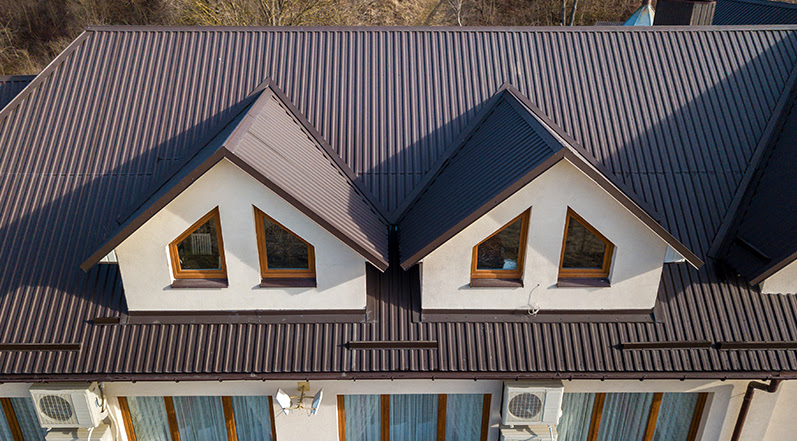
Then, you got your asphalt roofs. Now, here's something cool (quite literally)! They mix in these nifty little things called cooling granules into the asphalt. These granules make the roof less sun-thirsty and help keep your home nice and chill. See why I said it was cool?
I've come to appreciate the combo of metal with its glossy, colorful coating and asphalt with its nifty cooling granules—they make quite a team. As I see it, these materials don't just control the home temperature but also help us use less energy in general.
Do you know what Energy Star Certification means, right? Whether the roof is made of colorful metal or cooling granule-loaded asphalt, they really know how to fight off solar radiation. That's basically what makes them super energy efficient. And if you think about it, it could save loads on your energy costs over the long haul!
Financial Rewards from Energy-Efficient Roofs
Choosing a rooftop that saves energy? It's not only good for the environment but also pretty nice for your wallet! Here's a shocker - you can get a tax credit of 10%. This means if you buy roofing products that are approved by the government, you'll save some money on your taxes!
The price of a new roof might be big, but that doesn't mean you won't gain from it. The tax credit you get helps to make it a bit cheaper. Just keep in mind that the money you get back from the government maxes out at $500. So, no matter if you spend $5,000 or more on your new roofing materials, you can't get more than $500 back in tax credits.
Keep in mind, though, that the tax credit only applies to the materials. You can't get cash back from the time and money you put into installing it.

Yeah, I know that the price tag to start might make you do a double-take. But think about this:
Energy-saving roofs typically last a long time. So, you're likely going to spend less money replacing it in the future.
On top of that, these roofs use a lot less energy - this means lower bills every month! Think about the future of your wallet; won't it be great when that high initial cost turns into a solid money-saver?
Don't forget your path to saving money starts with the tax benefit on materials. You may think it's no big deal - just 10% of the cost and a limit of $500, right? But add the money you'll be saving on energy expenses every month, and it turns out you'll be smiling all the way to the bank!
The upfront cost of having an energy-efficient roof might get you thinking - is it really worth it? But, when I weigh up the first round of costs with what I'll get back later, the math is clear. It's definitely a good deal and one that deserves a lot of thought.
An energy-efficient roof is hands down a smart money move. I'm not only talking about an expense; it's an excellent investment that'll bring in good rewards over time. Imagine a future with less energy use, roofs that last longer, and a stunning return on your first costs!
Timeline Extension for Energy Tax Credits
Good news, everyone! The IRS has extended the deadline for energy tax credits. This means homeowners now have more time to make energy-efficient changes – like getting a new, energy-saving roof – that make them eligible for these credits. Isn't that great?
The energy tax credit isn't as complicated as you might think. It's pretty much a way to lower what you owe in federal taxes to match the cost of energy-efficient upgrades to your home. And the best part is that the money you save goes straight into your pocket!
But there's one catch - you've got to stick to the timeline. If you don't, you could face serious monetary penalties. You might even risk losing next year's tax credit. Can you imagine giving away such a significant amount of money willingly? Picture this: you replace your old roof with a new, more efficient one but forget to claim the tax credit. Now, that's what I call a squandered chance.
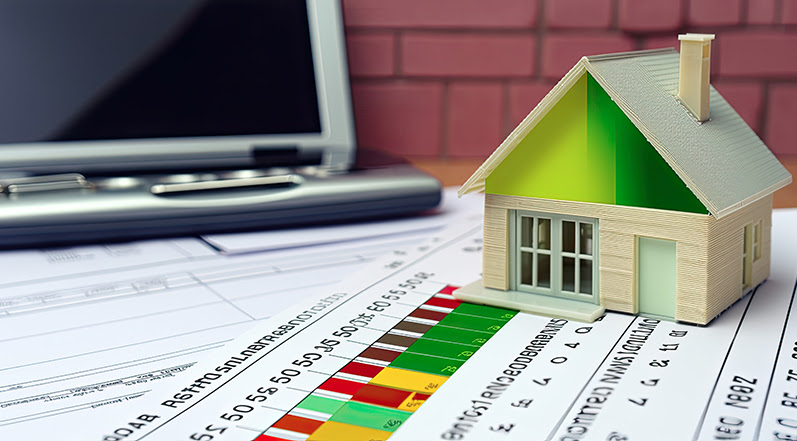
It's worth noting that the IRS is pretty strict when it comes to deadlines. So, any delay might make you lose out on what could have been a financial bonus. Come on – with this extended deadline, it feels like good sense to look into making greener home improvements and finding ways to lower your tax bill.
Let's be real; this extension is a fantastic opportunity to make a smart investment in your home. And one can't deny the appeal of the government helping out with those renovations. What matters now is to check if your upgrades meet the eligibility requirements and to act promptly to install that energy-efficient roof. I know I definitely will!
What Is The Solar Investment Tax Credit (ITC)?
So, what's this Solar Investment Tax Credit (ITC) I keep hearing about? Well, basically, it's help from the government to make solar energy systems more affordable for everyone. They do this by offering a tax credit related to the cost of putting in a solar system. This credit is a big deal for anyone thinking about switching to solar power.
Want to know how big? Let's talk numbers. Right now, the ITC is promising a credit of 30% of your installation cost. Imagine an installation costs you $10,000. With that tax credit, you are looking at a $3,000 cut in federal income tax-now that's savings!
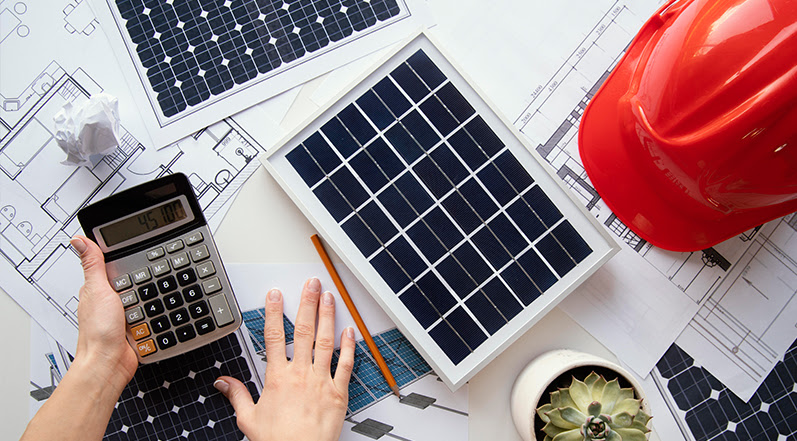
But there's a catch. In the future, the ITC looks like it's going to drop. You might be asking why they are cutting the credit. The answer lies in the cost of solar technology. As we're beginning to see, solar technology is stepping out of the luxury bracket. They're becoming more common and cheap. So, for homeowners and businesses, the message is clear: if you're thinking about going solar, do it soon!
That's why knowing all about the ITC is so important. It affects how affordable solar energy is and will encourage more people to switch to solar, especially with the changes to the credit on the horizon. Being well-informed about this stuff puts you in a great position to benefit from the sun and do your part for our planet. The ball's in your court now!
How to Claim Your Energy Tax Credit
So, you're asking about how to get an energy tax break after getting a roof put in, right? You'll need to fill out and send off a special form to the IRS called Form 5695, or "Residential Energy Credits." This form helps calculate and hand out your energy credits.
But how do you tackle Form 5695, you might be wondering?
Well, you start with Part 1. You should take care of this section if the work done on your house made it more energy efficient - like getting a new roof fitted. In this section, Line 1 is for listing what you spent on things like solar electric property. In other words, the money spent on your new roof goes in Line 2. All the amounts from lines 1 to 4 are then added up and placed in Line 5, a.k .a. "Total qualified solar electric property cost."
Moving on, line 6 is meant for the general cost of any other installations that save energy, like solar hot water or wind power. The figures from lines 5 and 6 together give you the "total qualified solar property costs." This number goes in Line 7.
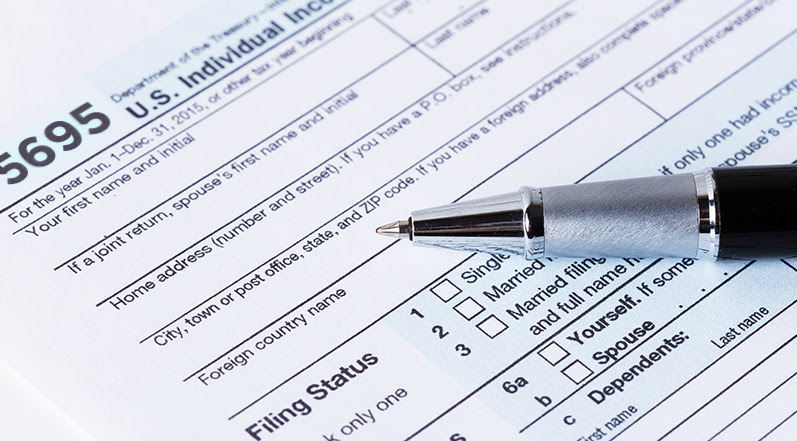
Too many numbers? Keep your Manufacturer's Certification Statement near at hand. It's a piece of paper from your roof-maker with important product info and proof that your roof is eligible for a tax break. It's a good idea to have a spare copy of this paper - it's a way to show that you've got approved energy goods.
Once you've finished Form 5695, take the credit amount from that form and put it on your Individual Income Tax Return, also known as Form 1040. Don't forget to attach Form 5695 when you file your tax return to the IRS.
Although the process might feel like a daunting dance of numbers, once you finish, it leads to a nice drop in your energy costs; in my experience, this is an awesome way to save some cash and do something important for our world. Saving energy has many uses beyond good for your wallet and our planet, too. I think it's a really worthwhile thing to do.
Will These Energy Credit Benefits Change?
So, how does this impact the solar panels you've installed on your roof?
You should be ready for unexpected shifts. These changes might make your solar panels more profitable or less profitable or could change the qualifications needed for credits. Understanding these shifting rules could mean the difference between getting a nice credit or losing out on a golden opportunity.
Wondering how to keep up with all of this? Don't stress! You can find reliable and current information about this on government websites and on forums about green energy. Also, you can trust traditional news channels to keep you updated about energy credits.
But what if you need advice that's specifically about your situation?
Then, get in touch with a tax pro who knows about energy credits. They can give you tips and information based on your unique needs.

By the way, I want you to think about these changes in a different way. Instead of causing worry, they should be a nudge to stay informed. This ability to adapt is proof of our shared mission to face environmental problems directly.
To put it basically, knowledge gives you power. If you stay in the loop about these changes, you'll be ready to make the most of your solar panels. I once missed out on a great energy credit because I wasn't up on all the rule changes; I don't want that to happen to you. In the always-changing world of energy credits, your help is a combination of readiness to add the right info.
Get a Free Roof Inspection Today
Energy credits are kind of a living thing, always changing. That means the rules for who can get them and how big they are might change, too. So, stay in the loop. If you're armed with the right info and some smart advice, you might be surprised at what you can achieve.
An energy-efficient roof is a big move! We're talking about a lot of steps you need to understand, like benefits, procedures, and possible stumbling blocks - so making things simpler is always better. That's where professionals come in.
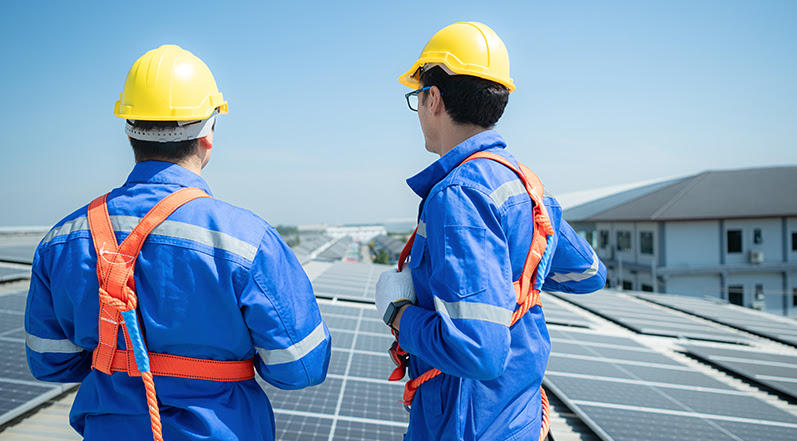
We're Colony Roofers, and we've been lending a hand in the commercial and residential roofing scene in Georgia, Florida, and Texas for a while now.
We're here, ready and waiting to help you make your move to an energy-efficient roof. Know what we've got tucked in our professional tool belt? Solid advice and top-notch repair and installation services. If you're feeling a little unsure, reach out to us; we'll even give you a free roof inspection. We think you should always talk to reliable roofers like us here at Colony Roofers, especially when you're navigating uncertain waters. Get in touch today!
 Call (678) 365-3138
Call (678) 365-3138



